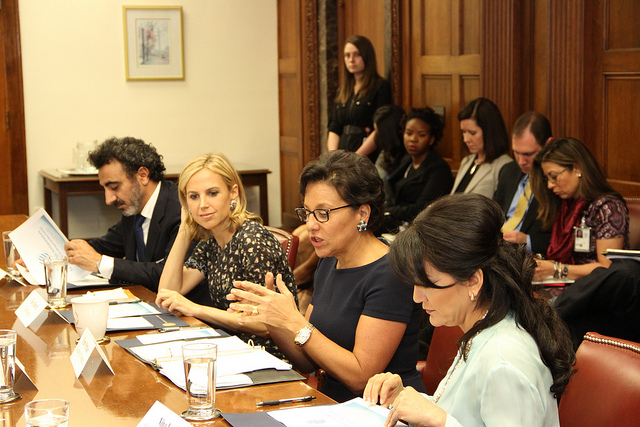Highlights
May 2014 Newsletter
Administration Launches Efforts to Support Global Entrepreneurship

Secretary Pritzker Meets with PAGE Program participants
Entrepreneurs play a critical role in expanding the economy and creating jobs. EDA, the Department of Commerce, and the Obama Administration are committed to supporting entrepreneurs across the country and globally. In this vein, the White House recently announced a series of new steps to accelerate the success of entrepreneurs in the United States and worldwide.
The Presidential Ambassadors for Global Entrepreneurship (PAGE) program brings together a diverse group of successful American businesspeople who have committed to sharing their time, energy, ideas, and experience to help develop the next generation of entrepreneurs at home and abroad. The group is chaired by Secretary of Commerce Penny Pritzker, and the U.S. Department of State and the U.S. Agency for International Development (USAID) are also partners in this effort.
Other federal agencies are embarking on efforts to promote entrepreneurship as well. The Department of Homeland Security (DHS) will soon publish several proposed rules that will make the United States more attractive to talented foreign entrepreneurs and other high-skill immigrants who will contribute substantially to the U.S. economy, create jobs, and enhance American innovative competitiveness.
The National Institutes of Health (NIH) and the National Science Foundation (NSF) are launching a new collaboration to empower entrepreneurial scientists and address the critical gap between fundamental research and the development of a commercial entity. Academic researchers and entrepreneurs who receive Small Business Innovation Research (SBIR) funding from NIH will be eligible to pilot a new version of the NSF Innovation Corps (I-Corps) program that is specially tailored for biomedical technologies. NIH will also help scale up I-Corps by augmenting existing NIH-funded programs, such as the NIH Centers for Accelerated Innovation (NCAI), that focus on promising technologies developed by academic researchers. Faculty and students who participate in these new I-Corps programs will receive mentorship opportunities, entrepreneurial training, and modest funding to enable them to move their ideas from the lab to the market.
USAID recently launched U.S. Global Development Lab (The Lab), which will empower a global network of individuals to help create, solve and scale innovative solutions to global challenges by applying rigorous scientific, business, research, and technological expertise. In the next five years, scientists and technology experts at The Lab will create a new global marketplace of innovations and take them to scale to reach over 200 million people worldwide. The Lab is expanding a Global Development Alliance furthering LGBT equality through entrepreneurship and small and medium enterprise growth in Latin America. A new USAID Research and Innovation Fellowships Program will send more than 60 young U.S. leaders in science and technology to universities, NGOs, and companies in 12 developing countries this year.
This fall, the State Department will host TechCamps for women in El Salvador, Colombia, and Argentina to provide training to address key challenges in business formation, from financing to marketing. Additionally, the State Department will be launching two new exchange programs for entrepreneurs in the Western hemisphere.


